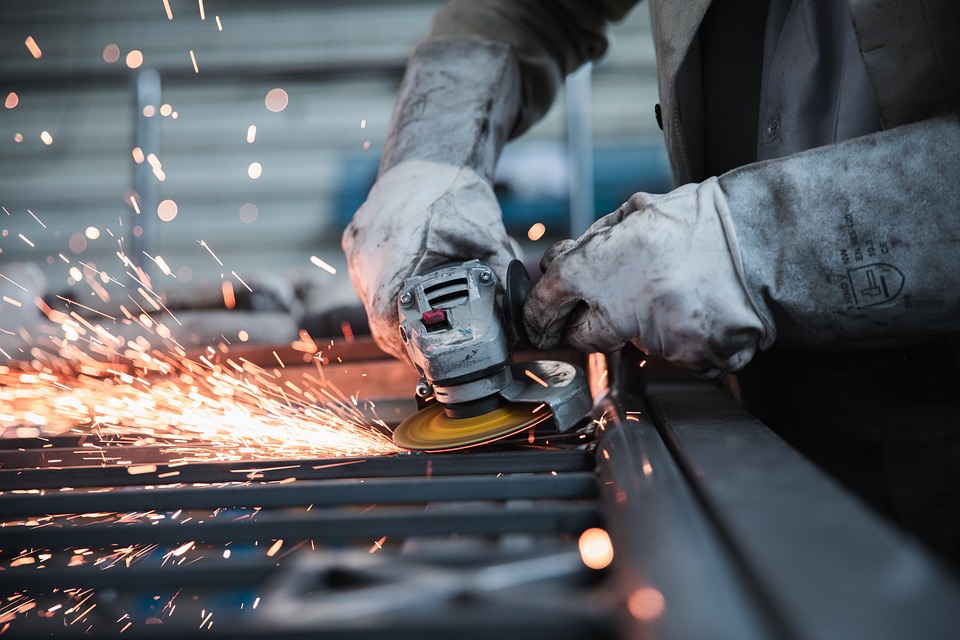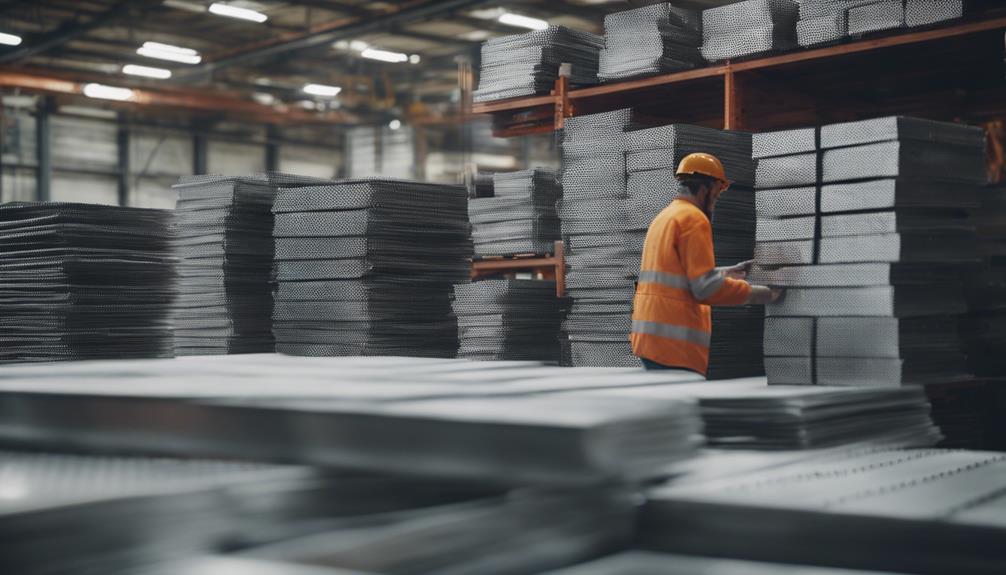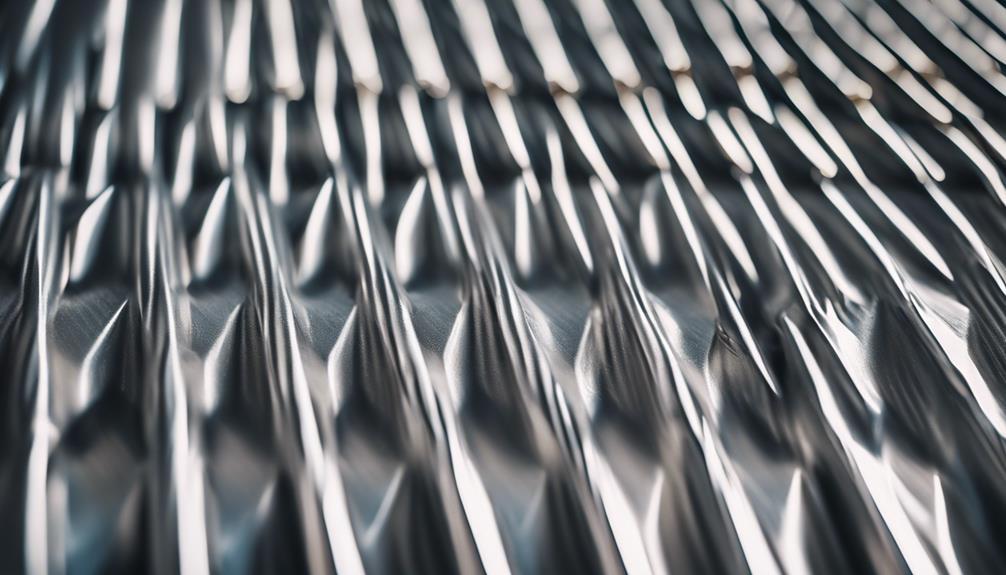Steel sheet is valued for its exceptional strength, durability, and smooth surface finish. Its tight dimensional tolerances and excellent formability make it ideal for easy fabrication in various industries. With custom sizing options available and different types of steel alloys to choose from, steel sheet offers versatility for specific project needs. The durability and strength of steel sheets guarantee they can withstand heavy loads and extreme forces, making them reliable for long-term use in construction, manufacturing, and industrial applications. The importance of steel sheet in the industry is vast and varied.
Key Takeaways
- Steel sheets offer exceptional strength and durability for various industries.
- Different types like Hot Rolled and Galvanized provide options for specific project needs.
- Custom sizing options available for precise fit and ease of installation.
- Steel sheets are highly durable, maintain shape under loads, and have a long lifespan.
- Galvanized sheets offer enhanced corrosion protection, ideal for heavy-duty applications.
Advantages of Steel Sheet
Steel sheets stand out in the construction industry due to their exceptional strength and durability. Cold Rolled Steel, a type of steel sheet, offers even greater strength due to the cold rolling process that increases its hardness and strength properties. This process also results in a smoother surface finish, making Cold Rolled Steel ideal for applications requiring a pristine appearance, such as automotive panels or appliances. Additionally, Cold Rolled Steel maintains tight dimensional tolerances and flatness, ensuring consistency across projects. Its excellent formability allows for easy fabrication into various shapes, meeting specific project requirements with precision. These advantages make Cold Rolled Steel a preferred choice for demanding construction projects where strength, durability, and a polished finish are essential.
Various Applications of Steel Sheet
Considering its diverse range of applications in various industries, the versatility of steel sheets extends beyond construction projects, signaling their significance in different sectors. Steel sheets are commonly utilized in general fabrication, equipment panels, and tool boxes due to their durability and strength. They are ideal for heavy-duty applications like automotive panels and fuel tanks, where robustness is essential. Galvanized steel sheets, offering enhanced corrosion protection, are well-suited for outdoor projects and decorative interior design elements. Additionally, steel plates, providing a thicker material option, are preferred for applications requiring additional strength. Custom sizing options for both steel sheets and galvanized variants cater to specific project requirements, ensuring a tailored fit for diverse industrial needs.
Types of Steel Alloys for Sheet
Among the various alloys used for manufacturing steel sheets, Hot Rolled Steel Sheet (ASTM A1011 CS Type B) stands out as a cost-effective choice known for its slightly grainy surface, making it an excellent selection for painting applications. Another notable alloy is Galvanized Steel Sheet (ASTM A653 CS G-90 CHEM TREAT), offering enhanced corrosion protection suitable for outdoor projects. Galvanized Steel Sheets are coated with a layer of zinc to prevent rusting and corrosion, extending their lifespan to 20 years or more in harsh environments. This makes Galvanized Steel Sheets a popular choice for applications requiring durability and longevity. When considering steel alloys for sheet manufacturing, the choice between Hot Rolled Steel and Galvanized Steel depends on factors such as project requirements, budget, and environmental conditions.
Custom Sizing Options Available
Tailored dimensions for steel sheets can be customized to meet specific project requirements, guaranteeing precise fit and minimal waste. Custom sizing options are available for both steel sheets and galvanized options, allowing for precision cutting and reducing excess material. This service ensures that the steel sheet fits the project's exact specifications, providing flexibility and customization for various applications. By opting for custom sizing, customers can guarantee that the sheet will meet their unique needs, whether for construction, manufacturing, or other projects. The ability to tailor the dimensions of the sheet to precise requirements not only enhances the overall quality of the project but also streamlines the installation process.
Durability and Strength of Steel
With a focus on the robust characteristics of steel, its durability and strength make it a preferred choice for applications requiring resilience and structural integrity. Steel sheets are known for their high durability, offering excellent resistance to bending, warping, and deformation. This robustness enables them to maintain their shape under significant loads and impacts, ensuring structural integrity in various heavy-duty applications. The strength of steel sheets allows them to withstand extreme forces, making them reliable for long-term use without compromising performance. Due to these qualities, steel sheets have a long lifespan and are commonly utilized in construction, manufacturing, and industrial settings where resilience and strength are paramount.
Importance in Construction Industry
Steel sheets hold a pivotal role in the construction industry due to their unmatched strength, durability, and adaptability across a wide range of applications. These sheets are vital for various construction purposes such as structural components, roofing, cladding, and reinforcement in buildings and infrastructure projects. Their high resistance to impact, fire, and adverse weather conditions makes them a preferred choice, ensuring long-term structural integrity and safety. By incorporating steel sheets in construction, stability, load-bearing capacity, and overall safety of the built environment are greatly enhanced. Modern construction practices heavily rely on steel sheets to provide efficient solutions for architects, engineers, and builders to meet the demanding structural requirements of today's projects, making them indispensable in the construction industry.
Resistance to Corrosion in Steel
Ensuring long-lasting durability and protection against rust and corrosion, resistance to corrosion in steel sheets plays an important role in maintaining structural integrity in various environments. Galvanized steel sheets, with their zinc coating, exhibit excellent corrosion resistance, particularly suited for outdoor projects. The zinc coating on galvanized steel acts as a sacrificial anode, safeguarding the underlying steel from rust and corrosion. This process enhances the longevity of galvanized steel sheets, making them capable of lasting over 20 years in outdoor settings. Corrosion resistance in steel sheets is essential for prolonged durability, especially in high-moisture or harsh environments where protection against corrosion is necessary. The galvanizing process forms a protective barrier on steel sheets, augmenting their resistance to corrosion and extending their lifespan significantly.
Online Metals Steel Sheet Selection
For those seeking diverse steel sheet options, Online Metals presents a wide selection including hot rolled, cold rolled, and galvanized steel sheets. Customers can choose from thickness options ranging from 24Ga to 11Ga to meet various project needs. Galvanized steel sheets, offering enhanced corrosion protection with a typical lifespan of 20 years or more, are also available. Online Metals accommodates custom sizing for steel sheets and galvanized options to fulfill specific project requirements. Detailed product specifications, tolerances, and variations are provided to guarantee accurate selection. Additionally, Online Metals prioritizes customer data security through a strict Privacy Policy, safeguarding personal information shared during transactions or inquiries.
Frequently Asked Questions
How Much Does a 4×8 Sheet of 10 Gauge Steel Weight?
The weight of a 4×8 sheet of 10 gauge steel is approximately 160 pounds. Understanding this weight is essential for handling and transportation considerations. It is commonly used in applications that require strength and durability.
How Thick Is 24 Gauge Steel?
24 gauge steel is approximately 0.0239 inches thick. This thickness provides a balance between flexibility and durability, making it suitable for various applications like HVAC ductwork, roofing, and decorative projects. The material can be easily cut, formed, and manipulated for specific fabrication needs.
What Is Sheet Steel Used For?
Sheet steel is a versatile material utilized in various industrial and decorative applications. Its durability, design flexibility, and strength make it ideal for duct work, siding, roofing, kitchen cabinets, tabletops, and arts and crafts projects, meeting diverse project needs effectively.
How Thick Is 22 Gauge Steel?
The thickness of 22 gauge steel is approximately 0.0299 inches. This gauge is commonly utilized in various applications such as general fabrication, equipment panels, and tool boxes. Its thickness strikes a balance between strength and flexibility, making it a versatile choice for projects.










